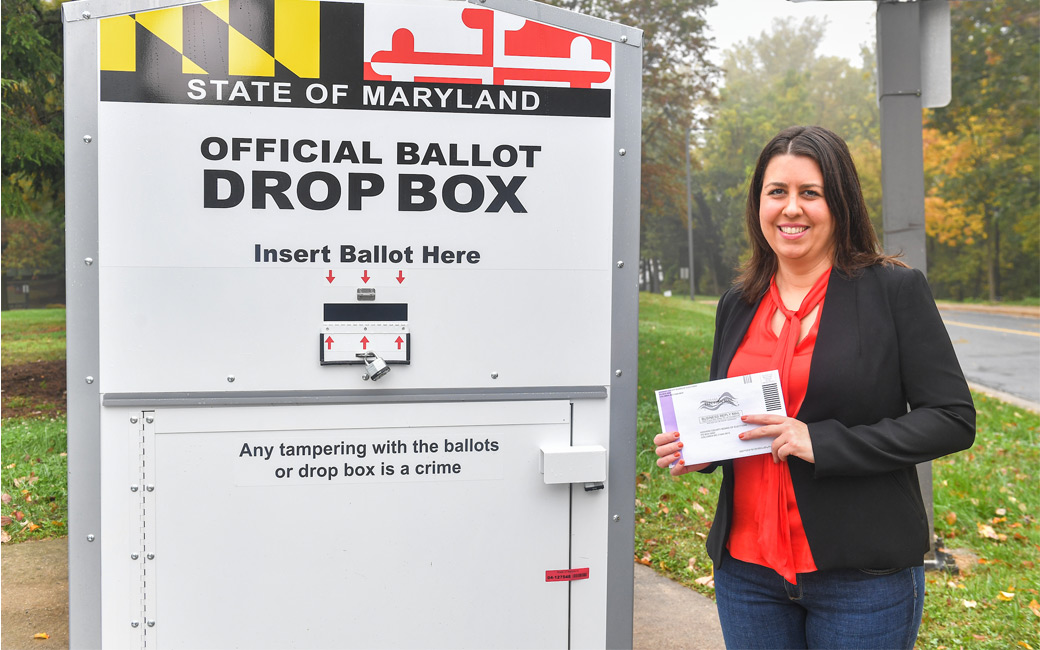Mail-in voting secure, TU study finds
Towson University experts lead the way on latest elections security findings
January 26, 2022

More than one year after U.S. President Joseph Biden Jr. was sworn in, the nation is still talking about the 81 million votes cast in his victory over former President Donald J. Trump.
Towson University College of Business & Economics associate professor and elections security expert Natalie M. Scala and Josh Dehlinger, a professor in the Department of Computer & Information Sciences in the Jess & Mildred Fisher College of Science & Mathematics, have co-authored a new study that shows mail-in voting is secure and does not jeopardize the safety of the U.S. elections process.
Instead, mail-based voting increases voter access and reduces the likelihood of adversarial interference, according to the findings. Already, the study has caught the attention of the national media. “Newsweek,” Courthouse News, Yahoo, the American Association for the Advancement of Science and Phys.org have all covered the findings.
Scala and Dehlinger, along with former students Yeabsira Mezgebe ’20, ’21; Betelhem Jilcha ’20, ’21 and Isabella Bloomquist ’20, ‘21, examined the risks involved with mail-based voting with colleagues from TU and the U.S. Military Academy. Their investigation focused on the only known mail voting "attack tree," generated in 2009 by the U.S. Elections Assistance Commission (EAC) and the University of South Alabama. This graphical representation divides dozens of potential attack scenarios, from the registration of deceased voters to coercion of voters via advertisements, into three categories: insider threats, external threats and voter error.
“ What we found in our study is that the dramatic scale-up of mail voting in the 2020 election did not increase risk. ”
Using Maryland as a case study, the researchers updated the attack tree to include critical infrastructure considerations, reflect the concept of the adaptive adversary and respond to changes driven by the COVID-19 pandemic. These changes include the use of more drop boxes, extra time for returning ballots and more allowable reasons to request absentee ballots. An investigation of local and national media reports, literature review, poll work training manuals, documentation from bipartisan think tanks and organizations and voter instruction sheets as well as discussions with board of elections officials, allowed the researchers to identify 30 new threats. Insider threats included manipulating a return envelope, deliberately misspelling a name on a ballot and denying or altering a vote. External threats included stealing or destroying ballots, acquiring access to a drop box and stealing blank ballots from mailboxes. An expired voter ID was a new threat assigned to voter error.
The updated attack tree included a total of 73 potential threat scenarios associated with mail-based voting (40 insider, 23 external and 10 voter error). Using an established assessment framework, the researchers then conducted an analysis to determine the relative likelihood of each attack scenario.
None of the 30 new threats were identified by the analysis as of high concern.
Says Scala, "What we found in our study is that the dramatic scale-up of mail voting in the 2020 election did not increase risk. We argue that expanding mail voting is safe and should be used moving forward because it increases voter access and reduces the likelihood of adversarial interference."
It’s not the first time the pair’s research has driven international discussion. Scala and Dehlinger have conducted research on protecting elections from physical threats and insider risks for more than four years. Empowering Secure Elections is a BTU Signature Project, serving as an example of TU’s commitment to community engaged teaching, learning, and research.
Scala and Dehlinger’s Empowering Secure Elections research was selected as a Baltimore Towson University (BTU) 2020 award recipient. It has also been selected as a recipient of a Towson University Foundation grant in 2022.
Scala and Dehlinger have had more than a dozen students help them with research and make real-world contributions.
Scala, who is also director of the graduate program in supply chain management, presented findings from previous elections security research in a keynote address during NATO’s Operations Research and Analysis Conference last fall.
As a result of her elections security research, Scala received a University System of Maryland (USM) Board of Regents Faculty Award in 2021 for Excellence in Public Service.
The pair’s research has received national acclaim as well.
The EAC named Maryland’s Anne Arundel County, which partnered with Towson University faculty and students to improve elections security, winners in the 2020 Clearinghouse Awards, a national competition for best practices in election administration.
Scala and Dehlinger developed training modules for local elections boards to bolster security, which Anne Arundel County used to win in the category of Outstanding Innovation in Election Cybersecurity & Technology.